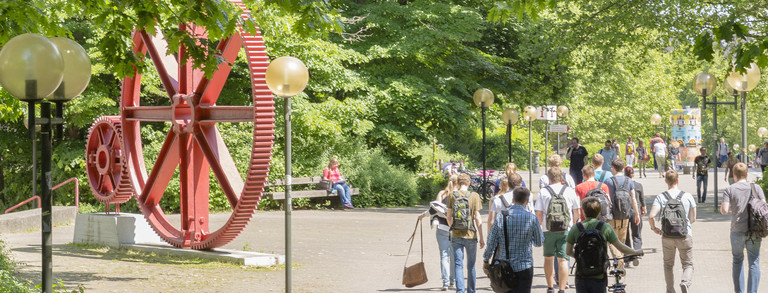FRAME: Leisure travel of senior citizens: Conditions, forms and decisions (2000-2003)
The relevance of senior citizens' leisure travel will considerably increase in the future due to demographic and societal trends. Since elderly will be more likely to hold a driving license and a car in the future, an increase in car use is more than likely. At the same time, the 'ageing' of young lifestyles into the elderly population may lead to a considerable pluralisation of leisure activities and transport demand among the elderly, particularly among the 'young old'. Nevertheless there are and will be substantial limitations in mobility among some elderly. These limitations are associated with a lack of participation in public life and a loss of well-being and life quality.
The aim of the project FRAME was to develop environmentally, socially and economically sustainable transport supply schemes for leisure activities of senior citizens. An important question of the project was to figure out which forms of transport the elderly perceive, prefer and actually use in their leisure time. For instance, what are the reasons for (not) using public transport? Is there a lack of user specific supply forms? Do the elderly spend their leisure time in the immediate residential environment, or are nowadays seniors 'hypermobile' and always on the move? How do the elderly rate different modes of travelling? Which determinants affect the demand for leisure mobility? Does the private car contribute to satisfaction and mobility?
Methodologically, the project was based on three elements: (1) nationwide research and review of planning schemes for leisure transport and the consideration of seniors' needs in spatial / transport planning and policy on the community and regional level; (2) analysis of the built environment with a focus on public transport and leisure facilities in a case study region and particularly in the immediate neighbourhood; (3) a household survey that was the core element of data collection (n=4.500 individuals). The case study region was the region of Bonn and a part of the Eifel, a rural area located about 50 km from Bonn. In terms of spatial subcategories, it was mainly distinguished between urban, suburban and rural contexts. Within these contexts, we could further subdivide on a fine-grained basis (e.g. by settlement size or centrality).
As a result of the surveys, recommendations were developed to improve the mobility of senior citizens by taking the diverse needs of the elderly as well as the societal goal of sustainability into account. In order to achieve practical relevance, the developed approaches addressed the view of the supply side over and above the perspective of the (potential) users. This was realised by inviting experts from leisure facilities and transport industry to participate in the project process. Firstly, the developed recommendations were discussed in a workshop at the University of Bonn. Secondly, the project team was steadily in touch with various experts from planning and administration.
The project was executed at the transport research group, Department of Spatial Planning.
Cooperation partners:
Fachgebiet Verkehrswesen und Verkehrsplanung (Prof. Dr.-Ing. Christian Holz-Rau, Prof. Dr. Joachim Scheiner)
Psychologisches Institut, Universität Bonn ((www.psychologie.uni-bonn.de)
Geographisches Institut, Universität Bonn (www.giub.uni-bonn.de).
Project coordinator: Prof. Dr. Georg Rudinger, Center for Evaluation and Methods, University of Bonn.
Funding: German Federal Ministry of Education and Research (www.bmbf.de)
Executive organisation: Mobility and Transport, Building and Housing (www.tuvpt.de, www.freizeitverkehr.de/aeltere.htm)
The project was part of the research programme 'Leisure transport' of the German Federal Ministry of Education and Research (www.freizeitverkehr.de)
Project start and end Oktober 2000 – November 2003
Contact:
Joachim Scheiner, joachim.scheiner@tu-dortmund.de, Tel.: 0231 755-4822
Publications:
Kasper, Birgit (2007): Mobilität älterer Menschen. In: Bracher, Tilman / Holzapfel, Helmut / Kiepe, Folkert / Lehmbrock, Michael / Reutter, Ulrike (Hrsg.): Handbuch der kommunalen Verkehrsplanung, Kapitel 3.2.6.2. Heidelberg.
Scheiner, Joachim (2006): Does the Car Make Elderly People Happy and Mobile? Settlement Structures, Car Availability and Leisure Mobility of the Elderly. In: European Journal of Transport and Infrastructure Research 6(2), S. 151-172.
Scheiner, Joachim (2006): Auswirkungen des demographischen Wandels auf den Verkehr. In: Gans, Paul / Schmitz-Veltin, Ansgar (ed.): Demographische Trends in Deutschland. Folgen für Städte und Regionen. Forschungs- und Sitzungsberichte der Akademie für Raumforschung und Landesplanung 226. Hannover. S. 131-153.
Beckmann, Klaus J. / Holz-Rau, Christian / Rindsfüser, Georg / Scheiner, Joachim (2005): Mobilität älterer Menschen - Analysen und verkehrsplanerische Konsequenzen. In: Echterhoff, W. (ed.): Strategien zur Sicherung der Mobilität älterer Menschen. Köln. S. 43-71.
Scheiner, Joachim (2005): Bestimmungsgrößen der Freizeitmobilität älterer Menschen: Die Bedeutung von Siedlungsstrukturen und Pkw-Verfügbarkeit. In: Zeitschrift für Verkehrswissenschaft 76/2, S. 164-189.
Beckmann, Klaus J. / Holz-Rau, Christian / Rindsfüser, Guido / Scheiner, Joachim (2005): Mobilität älterer Menschen – Analysen und verkehrsplanerische Konsequenzen. In: Echterhoff, Wilfried (Hg.): Strategien zur Sicherung der Mobilität älterer Menschen. Köln. S. 43-71.
Kasper, Birgit / Scheiner, Joachim (2005): Spatial Development and Leisure Mobility in an Ageing Society. In: Williams, Katie (Hg.): Spatial Planning, Urban Form and Sustainable Transport. Aldershot: Ashgate. S. 83-101.
Rudinger, Georg / Holz-Rau, Christian / Grotz, Reinhold (Hrsg.) (2004): Freizeitmobilität älterer Menschen. Dortmunder Beiträge zur Raumplanung: Verkehr 4. Dortmund.
Holz-Rau, Christian / Scheiner, Joachim (2004): Verkehrsplanung und Mobilität im Kontext der demografischen Entwicklung. In: Straßenverkehrstechnik 48(7), S. 341-348.
Holz-Rau, Christian / Scheiner, Joachim (2004): Verkehrsplanung und Mobilität im Kontext der demografischen Entwicklung. In: Straßenverkehrstechnik 48(7), S. 341-348.
Scheiner, Joachim (2004): Aktionsräume älterer Menschen in der Freizeit. Räumliche, soziale und biographische Bezüge. In: Raumplanung 114/115, S. 137-142.
Kasper, Birgit (2004): Begründungen und Motive der Freizeitmobilität älterer Menschen - Ergebnisse einer qualitativen Untersuchung. In: Dalkmann, Holger / Lanzendorf, Martin / Scheiner, Joachim (Hg.): Verkehrsgenese. Entstehung von Verkehr sowie Potenziale und Grenzen der Gestaltung einer nachhaltigen Mobilität. Studien zur Mobilitäts- und Verkehrsforschung 5. Mannheim. S. 165-182.

